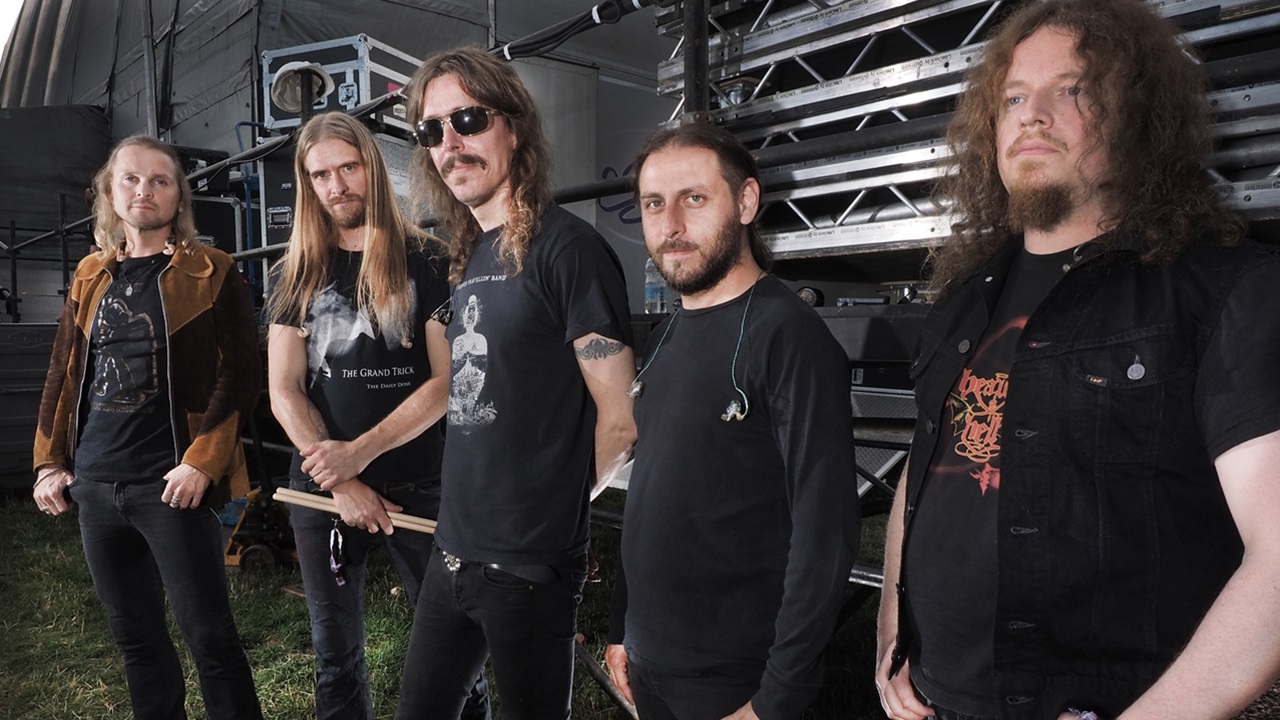Every Opeth album ranked from worst to best
From 1995's Orchid through to 2024's The Last Will And Testament, we ranked every Opeth album in order of greatness

Between the chainsaw buzz of Swedish death metal, church-burning notoriety of Norwegian black metal and the soon-to-explode school of Gothenburg melodeath, Scandinavia was already earning a reputation as a hotbed of extremity in the 90s.
But few bands - if any - could match the sheer ambition and songwriting craft of Opeth. The Stockholm based band formed in 1990 and soon set about changing the extreme metal landscape, folding in elements of folk, prog and beyond to craft immense, multi-layered compositions that would inspire countless bands in the ensuing decades.
So where do you start with a band like that? Well, that's where we come in - we've taken the task of listening to every Opeth record and deciding which albums rule over all. Right away we'll preface this: there is no such thing as a truly bad Opeth album. Each is an impressive display of musicianship and craft that could put so many other bands to shame, but some records have to win - and conversely, something ultimately has to lose. So with no further ado, here are the best Opeth albums, ranked in order of greatness.

14. Pale Communion (Roadrunner, 2014)
After digging deep into their love of prog on 2011's Heritage, Pale Communion saw overindulging in instrumental prog complexities. The result is still ambitious, if overly pendulous and indulgent, losing sight of the refinement they had achieved on Blackwater Park and beyond.
Compared to its predecessor, Pale Communion feels more limited in scope, still incorporating bits of jazz and funk into a prog framework but executed in such a way that it often feels one-note. Coming from a band that had so deftly mixed disparate unique elements from their earliest days, it feels like a serious backslide.
13. Orchid (Candlelight, 1995)
Arriving at a time where Sweden was fostering the Gothenburg sound and Norwegian black metal had passed the peak of its infamy, Orchid finds Opeth forging their own path amidst Scandinavia's prolific extreme metal movements, drawing on elements of classic death metal and black metal alike for an ambitious debut.
The epic song-lengths and complex compositions that would come to define Opeth are already in place, but Orchid shows a band who haven't quite yet figured out their sound. But in its own way, that lends it a unique charm, the sheer rawness of songs like In The Mist She Was Standing a thrilling counterpoint to the more controlled craft they would excercise going forward.
Sign up below to get the latest from Metal Hammer, plus exclusive special offers, direct to your inbox!
12. Morningrise (Candlelight, 1996)
Teaming back up with producer Dan Swanö - the man also behind the dials of their debut - Opeth's second record was a marked improvement sonically as their sound truly began to take shape. Imperious death metal intertwined with baroque folk guitars and swirling prog, the record is testament to the band's immense ambitions.
Unfortunately, it also comes across as a little too weighty at points, each of the songs crossing the 10-minute barrier while Black Rose Immortal takes the crown as Opeth's longest song at 20-minutes and 14-seconds. It's certainly not a bad album - in truth, there isn't a "bad" Opeth album as each is an ambitious showcase of their songwriting talents - but certainly can't match the band's breakthrough efforts at the turn of the millennium.
11. Heritage (Roadrunner, 2011)
Did Opeth throw the baby out with the bathwater on Heritage? Although the band had always flirted with prog, their tenth studio album saw them effectively propose marriage, move in and then loaf around wearing prog's tatty, oversized shirts. Not only was the death metal gone, but so too were many of the traditional elements of Opeth's sound, decidedly more psychedelic and jazz hues shining through even on the folksier tracks like I Feel The Dark and Haxprocess.
Opeth hadn't dialled back their ambitions any, however. Slither comes on like thrash-via-prog that could just as easily have come from the similarly creatively fertile minds of Mastodon, while The Devil's Orchard may just be the most complex radio single you've ever heard, all noodling guitars and odd time-signatures that make Tool seem geriatric by comparison. While it certainly took some adjusting, over a decade on from its release Heritage feels like the necessary creative overhaul Opeth needed to continue to evolve and move into the massive venues they would later inhabit.
10. Watershed (Roadrunner, 2008)
By 2008 Opeth were on a seemingly unstoppable commercial ascent, each of their successive albums from Blackwater Park climbing ever-higher in international charts. At the same time, the band had begun to settle into a creative groove that - while still undeniably brlliant - wasn't necessarily scratching the creative itch Akerfeldt was increasingly feeling.
Nonetheless, Watershed is an impressive beast to behold. Returning to the complex stylings of 2003's Deliverance, Watershed offers sonic and instrumental acrobatics aplenty across its 54-minute run-time, songs like The Lotus Eater representing possibly the best fusion of melody and brutality the band ever produced.
9. Sorceress (Nuclear Blast, 2016)
After overhauling their sound on Heritage and taking noodling prog as far as they could with Pale Communion, Opeth once again expanded their toolkit to include some classic elements with Sorceress.
The baroque folk of opener Persephone straight away feels like a blissful return to the acoustic noodling of the band's early days, while the sense of heft on the title-track, Era and Chrysalis proved Opeth didn't need death metal to be heavy, the latter just as forceful and immense as anything the band did in their death metal years.
8. My Arms, Your Hearse (Candlelight, 1998)
Although Morningrise nailed the dispartate elements of Opeth's sound, in execution it could often come across as overly clinical. My Arms, Your Hearse strikes a much more efficient balance, the propulsive rampage of April Ethereal returning a ferocity that its predecessor lacked whilst not losing sight of the prog grandeur Opeth were already beginning to flirt with.
At this point rising stars of the European metal underground, My Arms, Your Hearse helped cement Opeth's brilliance and although the band wouldn't enjoy true breakout success for a few more years, it can be considered the first essential Opeth record, some of its songs - Demon Of The Fall chief among them - seldom leaving setlists in the decades since.
7. Deliverance (Music For Nations, 2002)
By Mikael Akerfeldt's own admission, the choice to head straight back into the studio and try to record two albums simaltaneously so soon after the breakout success of Blackwater Park was a blunder. He's speaking personally, of course: Opeth were fried from a combination of extensive touring in support of Blackwater Park and the sudden need to write, record and mix two records at once, but creatively the band were on untouchable form.
Deliverance carries much of the same brilliance that had defined its predecessor, Opeth's sound maturing as they explored the outer reaches of extreme metal. Dialling up the complexity, Opeth were apparently taking inspiration from fellow Swedes Meshuggah going in to write Deliverance, but the end result is still undeniably a creation of their own design, forever the trend-setters rather than followers.
6. In Cauda Venenum (Nuclear Blast, 2019)
After rediscovering their stride on Sorceress, In Cauda Venenum sounds like a band reborn. The maximalism that had crept in on Deliverance is present and correct on Dignity - yes, we're sticking to the English titles, though will accept the Swedish language versions have an innate beauty and purity that makes them superior - a grandiose flourish of epic guitars giving way to gentle acoustic guitars.
In many ways, In Cauda Venenum feels like the spiritual successor to Watershed, its musical compositions and use of heft vs. melody on songs like Heart In Hand very much in keeping with the sonic ambitions of that album, bringing the band full circle without simply reintroducing extremity to the mix and sounding as fresh and creatively vibrant as they ever did.
5. Still Life (Peaceville, 1999)
Opeth's time on Peaceville was brief, but yielded impressive fruit. After embracing the concept album on My Arms, Your Hearse, Opeth revisited the idea with Still Life, weaving an anti-religious narrative around immensely dynamic progressive death metal.
Admittedly shifting the dials more towards the former than the latter, Still Life also marks the last point that Opeth can truly be considered underground, their rising stock and increasingly brilliant records about to turn them into a bona fide scene leaders. The balance between brutality and melody is on impressive display throughout Still Life, Mikael Akerfeldt truly coming into his own as a vocalist while the band even manage to fold the bombast and grandstanding of classic heavy metal in amongst the nimble-fingered acoustics.
4. The Last Will & Testament (Reigning Phoenix, 2024)
While the headline for Opeth's 14th album boils down to "Opeth got heavy again, everybody rejoices", there's so much more to The Last Will & Testament. A skittering, somersaulting sonic assault on the senses, the album both carried on with the prog inspired instrumental elements the band had embraced in the 2010s whilst bringing back a heft that many had sorely missed.
Throw in a huge concept around death, deceit and familial ties, some guest appearances from Ian Anderson and Joey Tempest, and a stunningly robust production job from Stefan Boman and its apparent that Opeth were once again at the apex of their creative powers. Åkerfeldt's time working on the Clark soundtrack clearly helping him refine ideas and embrace myriad influences and periods in a single, stunning opus.
3. Damnation (Music For Nations, 2003)
Opeth's first experiment with ditching death metal entirely remains their finest work in the form. Unlike later releases, where it can often feel like the band are painting with a more limited palette, Damnation still keeps much of the magic and wonder of Opeth's classic elements, embracing and exploring prog without losing some of their own identity in the process.
Damnation brings forth shades of psychedelia that would be explored in the band's later material whilst also cultivating a sense of melancholic fragility perfectly served by the nimble-fingered fretwork of Peter Lindgren and Akerfeldt, songs like Windowpane and In My Time Of Need remaining firm favourites 20 years on from release.
2. Blackwater Park (Music For Nations, 2001)
Although Opeth's 90s output would earn them much acclaim, it was 2001's Blackwater Park that finally brought the band the popularity they so desperately deserved. In truth, stylistically Blackwater Park isn't a million miles away from the sound Opeth had pursued since My Arms, Your Hearse, but in execution there's no denying that everything is just better.
From The Leper Affinity to The Funeral Portrait and the title-track itself, each song plays out like a death metal symphony, sweeping movements and disparate elements folded together to strengthen the overall sound and give a sense of untouchable brilliance that is carried throughout the album. At the same time, the band's work with Steven Wilson added a whole new depth to their more melodic inclinations, creating a new high watermark for progressive extremity that countless bands have since aspired to, influencing everyone from Jinjer to Epica.
1. Ghost Reveries (Roadrunner, 2005)
There couldn't be a better sign of Opeth's establishment as one of the most exciting bands in metal than their signning to Roadrunner in 2005. Arriving just in time to participate in the label's Roadrunner United project, that still was somehow only the second most ambitious record Opeth were part of in 2005.
Let's not beat around the bush: Ghost Reveries is a masterpiece and opener Ghost Of Perdition may well be the song that best defines them, Mikael Akerfeldt telling Hammer in 2021: "there is a sense of excitement throughout my body whenever I know [Ghost] is the next song in the set." The rest of the album is no slouch either; The Baying Of The Hounds and The Grand Conjuration both invoke a swirling mysticism around multi-layered prog-death compositions, while Atonement goes full 60s psych. Closer Isolation Years even revisits the melancholic stylings of Damnation, effectively tieing a bow over everything the band had done to that point.

Opeth's latest album The Last Will & Testament is out now via Reigning Phoenix.
Staff writer for Metal Hammer, Rich has never met a feature he didn't fancy, which is just as well when it comes to covering everything rock, punk and metal for both print and online, be it legendary events like Rock In Rio or Clash Of The Titans or seeking out exciting new bands like Nine Treasures, Jinjer and Sleep Token.











![Opeth - The Grand Conjuration [OFFICIAL VIDEO] - YouTube](https://img.youtube.com/vi/AY5LRReFYus/maxresdefault.jpg)

